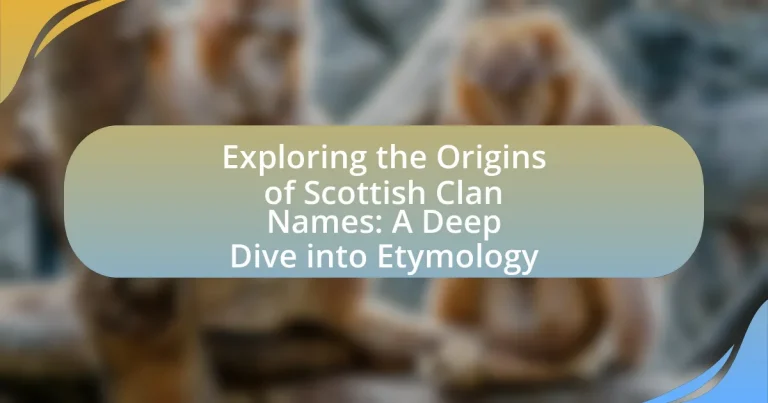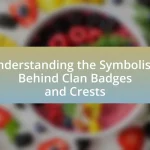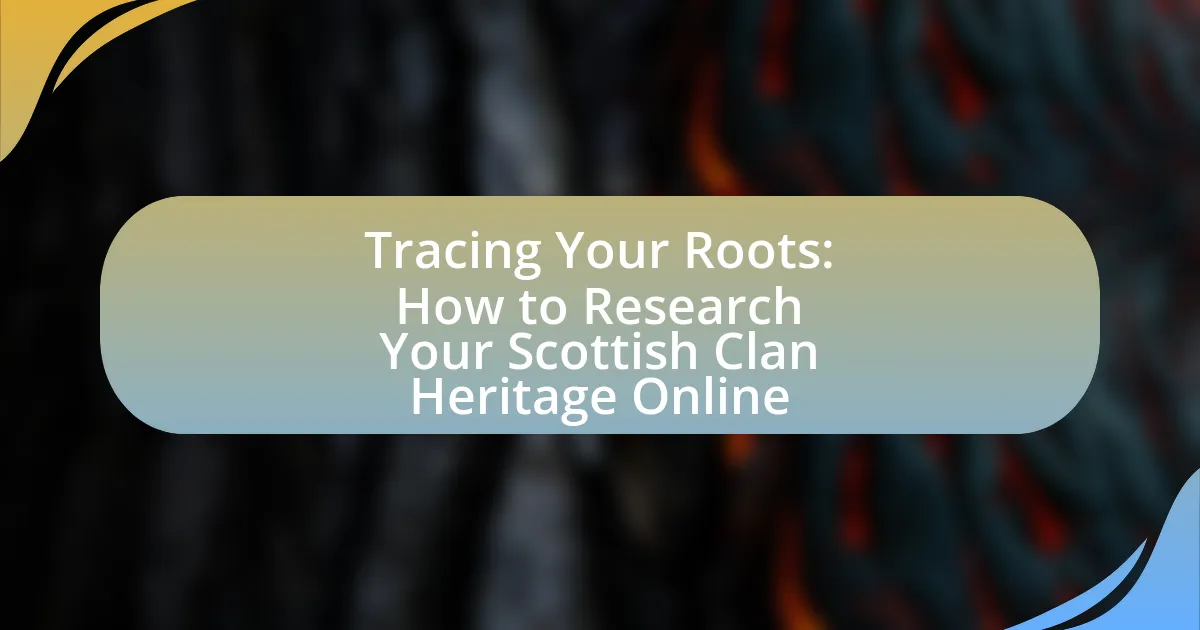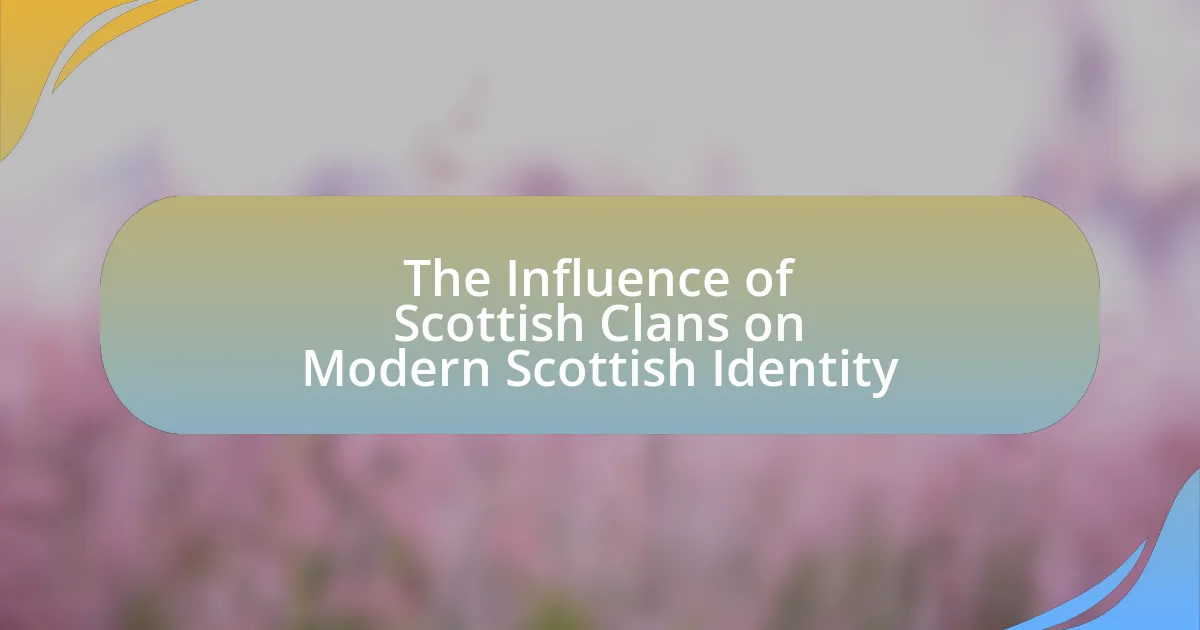Scottish clan names are hereditary surnames that signify lineage, heritage, and social identity within Scottish culture. These names often reflect geographical origins, historical events, or notable ancestors, serving as markers of familial ties and social status. The article explores the origins of these names, tracing their etymology from Gaelic and Old Norse influences, and discusses how historical events, geographical factors, and linguistic characteristics have shaped their development. Additionally, it examines the significance of clan names in Scottish culture, their role in identity and heritage, and the resources available for researching clan name origins.

What are Scottish Clan Names and Their Significance?
Scottish clan names are hereditary surnames that signify lineage, heritage, and social identity within Scottish culture. Each clan name often reflects geographical origins, historical events, or notable ancestors, serving as a marker of familial ties and social status. For example, the clan name “MacDonald” translates to “son of Donald,” indicating descent from a common ancestor named Donald. The significance of these names extends beyond mere identification; they embody the history, traditions, and values of the clans, often associated with specific tartans, crests, and mottos that further enhance their cultural importance.
How did Scottish Clan Names originate?
Scottish clan names originated primarily from the Gaelic language, reflecting the lineage, territory, or notable characteristics of the clan. These names often derive from the names of ancestors, geographical locations, or descriptive terms, with many clans tracing their roots back to the early medieval period. For example, the name “MacDonald” means “son of Donald,” indicating a patrilineal connection, while “Campbell” is believed to derive from the Gaelic “Caimbeul,” meaning “crooked mouth.” Historical records, such as the “Book of Deer” from the 12th century, provide evidence of these naming conventions, illustrating the significance of clan identity in Scottish culture.
What historical events influenced the formation of these names?
The formation of Scottish clan names was significantly influenced by historical events such as the Norman Conquest of England in 1066, which led to the introduction of feudalism in Scotland and the establishment of powerful clans. The subsequent Wars of Scottish Independence in the 13th and 14th centuries further shaped clan identities as families rallied around leaders like William Wallace and Robert the Bruce, solidifying their names in the process. Additionally, the Jacobite uprisings in the 17th and 18th centuries reinforced clan loyalty and identity, as clans supported the Stuart claim to the throne, leading to the preservation and prominence of their names in Scottish history.
How do geographical factors play a role in clan name origins?
Geographical factors significantly influence clan name origins by reflecting the landscape, resources, and historical settlements of a region. For instance, many Scottish clan names derive from geographical features such as rivers, mountains, or valleys, indicating where the clan was established or where they thrived. Names like MacGregor, which means “son of Gregor,” are often linked to specific locations in the Highlands, while clan names like MacDonald reference the lands they occupied, such as the Isle of Skye. Additionally, clans often adopted names based on their proximity to significant landmarks, which served as identifiers for their territory and lineage. This connection between geography and clan identity is evident in historical records, where clan territories are mapped alongside their respective names, illustrating the direct relationship between the physical environment and the etymology of clan names.
Why are clan names important in Scottish culture?
Clan names are important in Scottish culture because they signify lineage, identity, and social structure. Each clan name represents a distinct family group with shared ancestry, often tracing back to a common ancestor, which fosters a sense of belonging and community among members. Historically, clans played a crucial role in Scottish society, particularly during the feudal period, where loyalty to one’s clan was paramount for survival and social cohesion. The significance of clan names is further underscored by their use in heraldry, legal documents, and cultural traditions, reinforcing the clan’s heritage and values.
What role do clan names play in identity and heritage?
Clan names serve as vital markers of identity and heritage, particularly within Scottish culture. They connect individuals to their ancestral lineage, reflecting familial ties and historical narratives. For instance, clan names often indicate geographic origins, social status, or notable ancestors, thereby preserving cultural history and fostering a sense of belonging among members. The significance of clan names is underscored by their role in clan gatherings and events, where individuals celebrate shared heritage and reinforce communal bonds. Historical records, such as the “Book of Clanranald,” illustrate how clan names have been integral in maintaining Scottish identity through centuries of social and political change.
How do clan names connect individuals to their ancestry?
Clan names connect individuals to their ancestry by serving as identifiers that reflect familial lineage and historical ties. Each clan name often originates from a specific geographic location, notable ancestor, or significant event, thereby linking individuals to their heritage. For example, the clan name “MacDonald” signifies “son of Donald,” indicating descent from a common ancestor named Donald. This naming convention is rooted in Scottish Gaelic traditions, where clan names encapsulate the history and social structure of families, reinforcing connections to shared ancestry and cultural identity.

What are the Different Types of Scottish Clan Names?
Scottish clan names can be categorized into several types, primarily including patronymic, locational, and descriptive names. Patronymic names derive from the given name of an ancestor, such as MacDonald, meaning “son of Donald.” Locational names indicate the geographical area associated with the clan, like Campbell, which originates from a place in Scotland. Descriptive names often refer to physical characteristics or traits, such as Black or Brown. These classifications reflect the historical and cultural significance of clans in Scotland, illustrating their lineage, territory, and attributes.
What are the categories of clan names?
Clan names can be categorized into several distinct types, primarily including patronymic, locational, occupational, and descriptive names. Patronymic clan names derive from the given name of an ancestor, often indicating lineage, such as MacDonald, meaning “son of Donald.” Locational names refer to geographical features or places associated with the clan, like Campbell, which originates from a specific location in Scotland. Occupational names denote the profession or role of an ancestor, such as Smith, indicating a blacksmith. Descriptive names provide characteristics or traits of the clan or its members, often reflecting physical attributes or behaviors. These categories illustrate the diverse origins and meanings behind Scottish clan names, highlighting their historical significance and cultural heritage.
How do surnames differ from clan names?
Surnames and clan names differ primarily in their scope and usage. Surnames are family names passed down through generations, typically indicating lineage or ancestry, while clan names represent a broader social group or kinship, often associated with a specific geographic area or heritage. For example, in Scotland, a surname like “MacDonald” signifies a family lineage, whereas “Clan Donald” refers to the entire clan, encompassing all individuals who identify with that clan, regardless of their specific surname. This distinction highlights the difference between individual family identity and collective group identity within Scottish culture.
What are the characteristics of Gaelic clan names?
Gaelic clan names typically exhibit characteristics such as patronymic origins, geographical references, and descriptive elements. Patronymic origins indicate lineage, often derived from the name of an ancestor, as seen in names like MacDonald, meaning “son of Donald.” Geographical references identify the clan’s territory or significant landmarks, exemplified by names like MacLeod, which can be linked to the Isle of Skye. Descriptive elements may highlight traits or occupations, as in the name O’Neill, which translates to “descendant of Niall,” where Niall is associated with strength. These characteristics reflect the historical and cultural significance of clan identities in Gaelic society.
How do clan names reflect social status and lineage?
Clan names reflect social status and lineage by indicating the historical roles and privileges associated with specific families or groups. In Scottish culture, clan names often derive from geographical locations, notable ancestors, or occupations, which signify the clan’s heritage and social standing. For example, clans like MacDonald or Campbell not only denote familial ties but also suggest the prominence and influence these families held in Scottish history, often linked to land ownership and military leadership. Historical records, such as the “Book of Clanranald,” illustrate how clan names were used to establish identity and hierarchy within Scottish society, reinforcing the connection between lineage and social status.
What is the significance of prefixes and suffixes in clan names?
Prefixes and suffixes in clan names are significant as they provide essential information about lineage, geographical origin, and social status. For example, the prefix “Mac” in Scottish clan names indicates “son of,” linking individuals to their paternal lineage, while “Nic” denotes “daughter of,” highlighting maternal connections. Suffixes like “son” or “dun” can indicate a familial or locational aspect, respectively. This linguistic structure not only preserves historical relationships but also reflects the social hierarchy and territorial affiliations within Scottish culture. The use of these elements in clan names has been documented in historical texts, such as the “Book of Clanranald,” which illustrates their role in identifying clan members and their heritage.
How do clan names indicate territorial claims?
Clan names indicate territorial claims by often incorporating geographical features or locations associated with the clan’s ancestral lands. For example, many Scottish clan names derive from the names of rivers, hills, or regions, signifying the areas that clans historically occupied or controlled. This practice is evident in names like MacDonald, which can be linked to the lands of Islay, and MacLeod, associated with the Isle of Skye. Such naming conventions serve as markers of identity and ownership, reflecting the clan’s connection to specific territories and their historical significance in the socio-political landscape of Scotland.

What is the Etymology of Scottish Clan Names?
The etymology of Scottish clan names primarily derives from Gaelic and Old Norse origins, reflecting the historical and cultural influences in Scotland. Many clan names are formed from the Gaelic word “clann,” meaning “children” or “descendants,” followed by a personal name, indicating lineage, such as “Clan MacDonald,” which means “children of Donald.” Additionally, some names have Norse roots, particularly in regions influenced by Viking settlements, such as “Clan Gunn,” which may derive from the Old Norse word “gunnr,” meaning “battle.” This linguistic diversity illustrates the complex heritage of Scottish clans, shaped by various invasions and migrations throughout history.
How can we trace the etymological roots of clan names?
To trace the etymological roots of clan names, one can analyze historical documents, linguistic patterns, and geographical origins. Historical documents such as clan charters, legal records, and genealogies provide insights into the origins and meanings of clan names. Linguistic analysis reveals how names evolved over time, often reflecting the language and dialects of the regions where clans were established. Additionally, examining geographical features associated with clan names can offer clues about their origins, as many names are derived from local landmarks or characteristics. For example, the clan name “MacDonald” derives from the Gaelic “Mac Dhomhnaill,” meaning “son of Donald,” indicating a lineage connection. This methodical approach combines historical, linguistic, and geographical evidence to accurately trace the etymology of clan names.
What linguistic influences shaped the development of these names?
The development of Scottish clan names was shaped by several linguistic influences, primarily Gaelic, Norse, and English. Gaelic, the native language of Scotland, contributed significantly to the formation of clan names, often reflecting geographical features or ancestral lineage, such as “Mac” meaning “son of” and “Nic” meaning “daughter of.” Norse influence emerged from Viking settlements, introducing names like “Gunnar” and “Ragnarr,” which were integrated into local naming conventions. English influence became prominent after the Norman Conquest, leading to the adoption of surnames that reflected land ownership or occupation, such as “Fitz” meaning “son of” in Norman French. These linguistic layers illustrate the complex historical interactions that shaped the etymology of Scottish clan names.
How do historical documents aid in understanding clan name etymology?
Historical documents provide critical insights into clan name etymology by offering context, linguistic evolution, and historical usage of names. For instance, records such as charters, legal documents, and genealogies often contain the earliest written forms of clan names, revealing their original meanings and the geographical or social factors influencing their development. Additionally, these documents can illustrate how names have changed over time, reflecting shifts in language, culture, and identity. For example, the use of the Gaelic language in historical texts can help trace the roots of names like MacDonald, which means “son of Donald,” back to specific historical figures or events. Thus, historical documents serve as essential resources for accurately interpreting the origins and transformations of clan names.
What are some examples of notable clan names and their meanings?
Notable clan names include MacDonald, which means “son of Donald,” indicating lineage; Campbell, derived from the Gaelic “Caimbeul,” meaning “crooked mouth,” referring to a physical characteristic; and MacLeod, meaning “son of Leod,” with Leod possibly being a personal name or derived from the Norse word for “people.” These names reflect familial ties and characteristics, showcasing the etymological roots of Scottish clans.
What does the name ‘MacDonald’ signify in terms of lineage?
The name ‘MacDonald’ signifies lineage as it translates to “son of Donald” in Gaelic, indicating a patrilineal descent from an ancestor named Donald. This surname is associated with the Scottish clan system, where ‘Mac’ denotes “son of,” reflecting familial ties and heritage. Historically, the MacDonald clan is one of the largest and most prominent clans in Scotland, with roots tracing back to the 12th century, specifically to Donald, the son of the Gaelic king of the Isles. This connection to a notable ancestor reinforces the significance of the name in terms of lineage and clan identity.
How does the name ‘Campbell’ reflect historical context?
The name ‘Campbell’ reflects historical context through its origins in the Gaelic language, specifically from “Caimbeul,” meaning “crooked mouth.” This name is associated with the Scottish clan Campbell, which emerged in the 13th century and played a significant role in Scottish history, particularly during the Wars of Scottish Independence. The Campbells were known for their political influence and territorial power, especially in Argyll, where they were granted lands by the Scottish crown. Their prominence is evidenced by their involvement in key historical events, such as the Battle of Glen Fruin in 1603, which highlighted clan rivalries. Thus, the name ‘Campbell’ encapsulates both linguistic heritage and the socio-political dynamics of medieval Scotland.
What resources are available for researching Scottish clan names?
Resources available for researching Scottish clan names include historical texts, genealogical databases, and clan societies. Historical texts such as “The Scottish Clans” by Frank Adam provide insights into clan histories and etymologies. Genealogical databases like Ancestry.com and Findmypast offer access to records that can help trace lineage and clan affiliations. Additionally, clan societies, such as the Clan MacGregor Society, often provide resources, publications, and expert guidance on clan heritage and names. These resources collectively support comprehensive research into the origins and meanings of Scottish clan names.
How can genealogical records assist in clan name research?
Genealogical records assist in clan name research by providing documented evidence of lineage and familial connections that can trace the origins and evolution of clan names. These records, such as birth, marriage, and death certificates, often include surnames that reveal historical affiliations with specific clans, thereby allowing researchers to establish a direct link between individuals and their ancestral clans. For instance, the Scottish clan system is deeply rooted in family lineage, and genealogical records can confirm membership in a clan by showing descent from a recognized clan leader or ancestor. Additionally, historical census data and land ownership records can further illuminate the geographical distribution of clans, enhancing the understanding of clan name origins and their significance in Scottish history.
What online databases are useful for exploring clan name origins?
Online databases useful for exploring clan name origins include the Scottish Clan Database, which provides detailed histories and etymologies of various clans, and the House of Names, which offers insights into surname origins and heraldry. Additionally, the National Records of Scotland contains historical documents that can shed light on clan lineage and name derivations. These resources are valuable for anyone researching the etymology and historical context of Scottish clan names.





